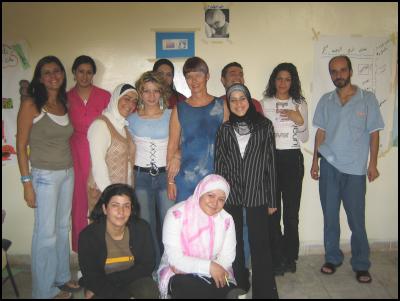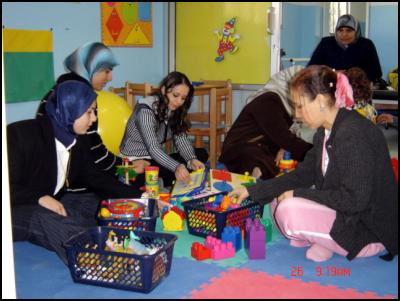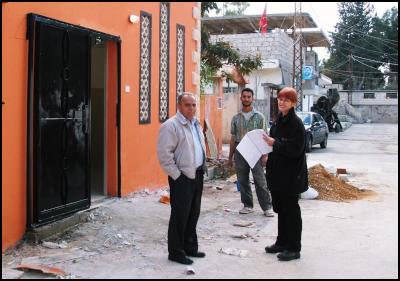Chris Ritchie: Kiwi Health Worker Found in Tyre
Found in Tyre: Kiwi health worker

(Photos courtesy of Christophe Saint Esteben)
Lebanon’s fourth largest city of Tyre, once the pearl in the crown of a Phoenician trading empire that stretched out to the Mediterranean shores of Europe and Africa, these days marches to a distinctively slower drum-beat than the country’s northern towns.
Young couples stroll down its recently-renovated Corniche promenade along the seaside before sunset and its marketplaces, some of whom appear to be survivors of the earliest times in its 5,000-year history, are busy enough but seem an age away from the bustling, modern metropolis of Beirut around 80 kilometres to the north.
Times are a world away also from the four decades of conflict that began in the 1960s when Tyre and surrounding areas of southern Lebanon had been a stage-set for a vicious tit-for-tat war between Palestinian commandos living in Lebanon and the all-powerful Israeli armed forces that pursued them.
The shooting died down just five years ago when an occupying Israeli army withdrew the last of its soldiers from Lebanese soil, 22 years after first despatching them in what, at the time, had been promised to be a swift military operation to destroy the Palestinian resistance movement.
Whether the present peace is sustainable, or merely another lull in ongoing shooting war, undoubtedly hinges on political developments often outside of locals’ control - not least of which, of course, is the unresolved Palestine refugee issue.
Palestine Refugee Population Of 400,000
In 2005, nearly sixty years since Israel’s creation and the mass, overnight arrival of so many of its indigenous Palestinian population to Lebanon, the United Nations Relief and Works Agency (UNRWA) has over 400,000 Palestinian refugees registered in the country, around half of whom reside in twelve camps scattered throughout Lebanon.
The stateless Palestinian population in the Tyre area, which is the Lebanese township closest to the border with Israel, is estimated at 102,124 and UNRWA’s role is to provide basic education, health and welfare services to camps in the area.
Rashideh, which has nearly 26,000 registered refugees, is the largest and stands just south of the city. Burj el-Shamali, with just under 19,000, is to the east while El-Buss, at the city’s northern entrance, has around 10,000.
There are also ten "gatherings" or "settlements" spread over 15 kilometres on the coastal area north of El-Buss that have a total population of registered refugees of 10,430.
But if UNRWA provides basic services, a vacuum exists in the provision of a range of specialist services required by the nation of stateless people and it is into this vacuum that New Zealander, Miranda Pittaway has stepped into the form of a project aimed at improving the living conditions for Palestine refugee children with disabilities.
A one-time physiotherapist with Capital Health in Wellington who has also studied international development at Massey University, Pittaway is a technical advisor with a Spanish non-governmental organisation called MPDL (Movimiento por la Paz, el Desarme y la Libertad) which successfully bid for funding from a pool of monies allocated to the area by the European Commission through its Humanitarian Aid Department.
The aim of the project is to increase the functional independence of disabled Palestinian refugee children working in collaboration with local NGO partners.
With a project budget of just 330,000 euros, MPDL’s 12-month operation which started on July 1 is targeted at disabled refugee children who need on-going rehabilitation services, home adaptation and - in a few cases - surgery to improve their daily functional abilities.
Part of the project’s work includes providing technical training to local NGOs and facility upgrades so that MPDL’s work can be sustained independently in a better future when foreign NGOs won’t be required.

Complicating life for disabled refugees is the reality that in many households there are no income earners because of labour market restrictions placed on Palestinians living in the Lebanon.
In practical terms that means that households with disabled children normally don’t have the money to pay for needed changes within their homes at the cost to the childrens’ intellectual and physical development.

So the MPDL project aims to put in place systems to alleviate unnecessary hardship in the form of rehabilitation centres, educational materials, local staff trained in occupational and speech therapy, and, where needed, access to on-call local orthopaedic surgeons for advice and possible surgical intervention.
The project undoubtedly alleviates the immediate needs of refugee families with special needs, but, as is often the case in this part of the world, politics and political reality have a habit of intruding into even the most mundane of every day activities.

The ultimate hope of Palestinians, and those working with them, is that the international community will put in place a permanent political settlement with appropriate institutions to service the ongoing needs of Palestinians without the need of either the NGOs or the U.N. relief agency established in 1949 initially with few months’ mandate.
But for now the Palestinian refugee population of Lebanon has no voting rights to select representatives to either the Israeli or the Lebanese Parliaments, which accordingly provide no services to the refugees in Lebanon.
The Palestine Legislative Council, which is elected solely by Palestinians living in the West Bank and Gaza districts recently abandoned by the Israeli army in favour of the Palestinian Authority, is similarly removed from the daily lives of Palestinian refugees in Lebanon.
One idea that has been floated by some politicians in Lebanon in recent times has been for the Palestine Legislative Council to take responsibility for providing services to Palestinian communities within Lebanon, with talk of a high-profile Palestinian politician being sent to Beirut as the first ambassador to represent the Palestine Authority.
The idea is perhaps a first tentative official acknowledgement from the Lebanese political establishment that Palestinians are a permanent fixture in the country and not a temporary group of refugees about to head home anytime soon and a community, moreover, needing input into representative institutions, even if to a separate authority to the Lebanese parliament.
Also on the agenda of at least some politicians in Beirut is for consideration to be given to a package of reforms which would include both the disarmament of the Palestinian camps at the same time as serious moves to revoke some of the restrictive labour and civil discrimination that Palestinians in the country continue to endure 57 years after their first arrival here.
It is too early to judge whether diplomatic moves in the direction of peacefully determining the final status of Palestinians in Lebanon in a compromise acceptable to both the four million citizens of Lebanon, and the 400,000 Palestinian non-citizens who make their home here, will amount to anything concrete.
But for the people of Tyre much is at stake, including whether their current peaceful town remains that way or descends back into the violent political conflicts of the second half of the 20th Century.
See
Also:
ENDS


 Keith Rankin: Dodgy Democracy, The Fiscal Double Standard, And The Application Of The Domino Theory To Ukraine
Keith Rankin: Dodgy Democracy, The Fiscal Double Standard, And The Application Of The Domino Theory To Ukraine Gordon Campbell: On Why GP Practices Are In Crisis
Gordon Campbell: On Why GP Practices Are In Crisis Ramzy Baroud: From Gaza To Syria - The Unyielding Reality Of Israeli Settler Colonialism
Ramzy Baroud: From Gaza To Syria - The Unyielding Reality Of Israeli Settler Colonialism Martin LeFevre - Meditations: The Polycrisis, Knowledge, And AI
Martin LeFevre - Meditations: The Polycrisis, Knowledge, And AI Ian Powell: Getting Out Of The Current Health System Mess
Ian Powell: Getting Out Of The Current Health System Mess Binoy Kampmark: More Guns, Less Butter - Starmer’s Defence Spending Splash
Binoy Kampmark: More Guns, Less Butter - Starmer’s Defence Spending Splash